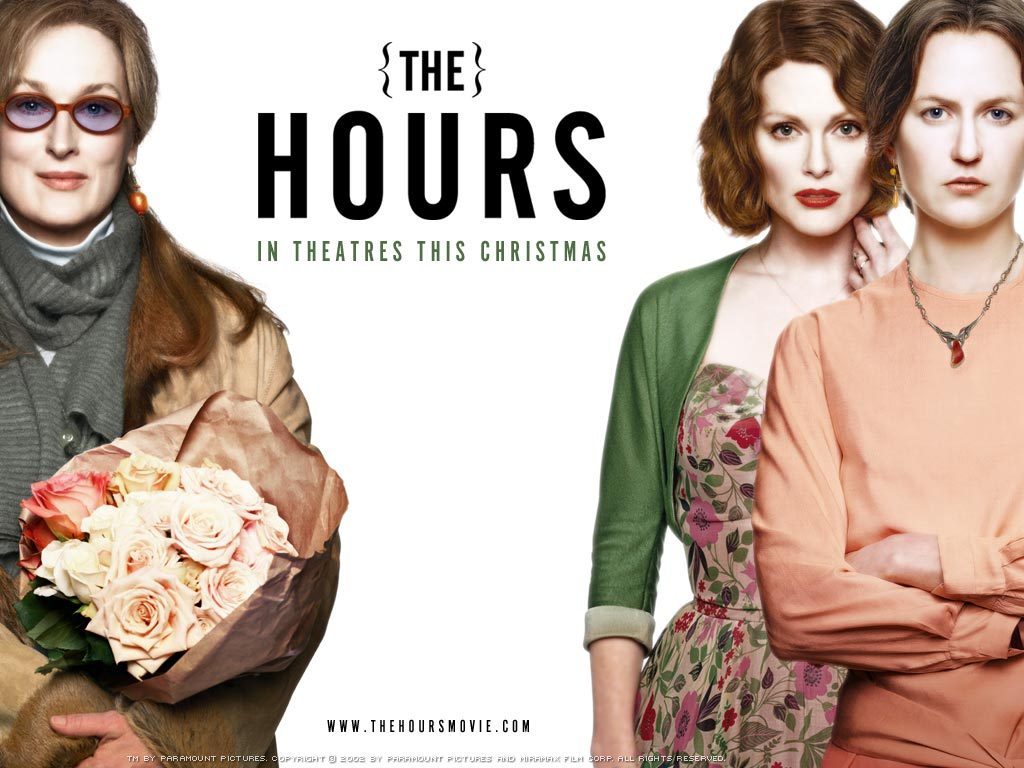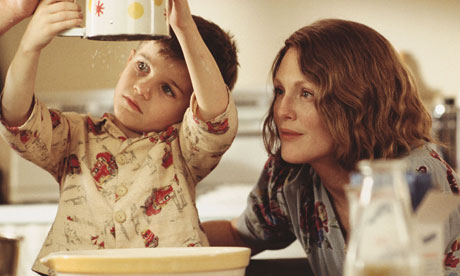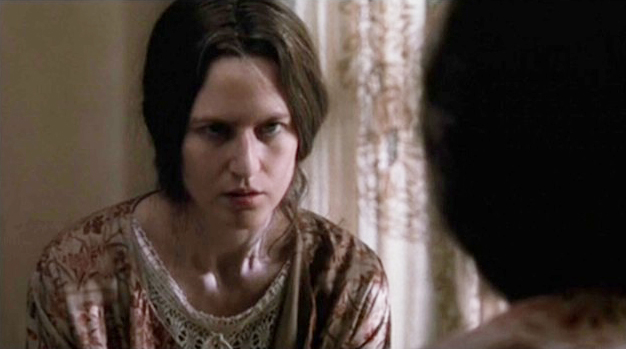← Back to Reviews
in
THE HOURS

Suicide is one of my least favorite topics, whether it be as part of a conversation or a way of dealing with a problem or the subject of a movie. I have always been of the belief that suicide is a selfish act of cowardice that doesn't solve anything and destroys the people who loved the victim. The effects of suicide as a concept and a reality are thoughtfully approached in 2002's The Hours, a slightly pretentious but compelling melodrama that melds three separate stories in a lethargic fashion, perhaps a bit too lethargic, but is watchable despite a thready screenplay that leaves a lot unexplained but crisp direction and a first rate cast will hold your attention.

The film begins with a look at the troubled author Virginia Woolf (Nicole Kidman) and her journey to writing the novel Mrs. Dalloway. We are then introduced to a 1950's housewife (Julianne Moore), pregnant with her second child, who is fascinated by the novel and, in 2002, a gay writer dying of aids (Ed Harris) and his best friend (Meryl Streep) who he refers to as Mrs. Dalloway and though it takes a minute, a connection other than Woolf's book does come into focus.

This film makes no qualms about the unhappiness of the characters and how they view suicide as the only option to relieve them of their misery...the film opens with Woolf attempting suicide before she even completes the novel that triggers this entire tale, but I think what bothered me about this film is that it is never really made clear why Woolf and Moore's character are so desperately unhappy. It's especially confusing with Moore's character...this woman seems to have everything a loving husband, a beautiful home, a child who adores her and another on the way but somehow you can see it coming from miles away that the woman is planning to kill herself. Confusion about her sexuality is hinted at but not fully explored. I was also troubled by the fact that when Moore takes her son to a sitter before executing her plan, there is a sense that her son knows exactly what she's planning to do and I had a hard time buying that.

The writer's motivations for wanting to end it are obvious, but this story is made watchable due to Streep's complete investment in the role of a woman who is still in denial about possibly being in love with this man at one time, even though she is lesbian herself and how her feelings seem to flood back with the return of her friend's ex-lover (Jeff Daniels).

Despite some unexplained character motivations, the film remains watchable due to Daldry's detailed direction and some first rate performances...Streep is marvelous, as always, and Nicole Kidman won the Best Actress Oscar for her performance, though I think she has done better work and Ed Harris amazes in a performance that earned him a nomination as did Moore's work as the unhappy 50's housewife. I wish some of the story holes had been filled better, but it's still worth watching for the performances alone.

Suicide is one of my least favorite topics, whether it be as part of a conversation or a way of dealing with a problem or the subject of a movie. I have always been of the belief that suicide is a selfish act of cowardice that doesn't solve anything and destroys the people who loved the victim. The effects of suicide as a concept and a reality are thoughtfully approached in 2002's The Hours, a slightly pretentious but compelling melodrama that melds three separate stories in a lethargic fashion, perhaps a bit too lethargic, but is watchable despite a thready screenplay that leaves a lot unexplained but crisp direction and a first rate cast will hold your attention.

The film begins with a look at the troubled author Virginia Woolf (Nicole Kidman) and her journey to writing the novel Mrs. Dalloway. We are then introduced to a 1950's housewife (Julianne Moore), pregnant with her second child, who is fascinated by the novel and, in 2002, a gay writer dying of aids (Ed Harris) and his best friend (Meryl Streep) who he refers to as Mrs. Dalloway and though it takes a minute, a connection other than Woolf's book does come into focus.

This film makes no qualms about the unhappiness of the characters and how they view suicide as the only option to relieve them of their misery...the film opens with Woolf attempting suicide before she even completes the novel that triggers this entire tale, but I think what bothered me about this film is that it is never really made clear why Woolf and Moore's character are so desperately unhappy. It's especially confusing with Moore's character...this woman seems to have everything a loving husband, a beautiful home, a child who adores her and another on the way but somehow you can see it coming from miles away that the woman is planning to kill herself. Confusion about her sexuality is hinted at but not fully explored. I was also troubled by the fact that when Moore takes her son to a sitter before executing her plan, there is a sense that her son knows exactly what she's planning to do and I had a hard time buying that.

The writer's motivations for wanting to end it are obvious, but this story is made watchable due to Streep's complete investment in the role of a woman who is still in denial about possibly being in love with this man at one time, even though she is lesbian herself and how her feelings seem to flood back with the return of her friend's ex-lover (Jeff Daniels).

Despite some unexplained character motivations, the film remains watchable due to Daldry's detailed direction and some first rate performances...Streep is marvelous, as always, and Nicole Kidman won the Best Actress Oscar for her performance, though I think she has done better work and Ed Harris amazes in a performance that earned him a nomination as did Moore's work as the unhappy 50's housewife. I wish some of the story holes had been filled better, but it's still worth watching for the performances alone.
